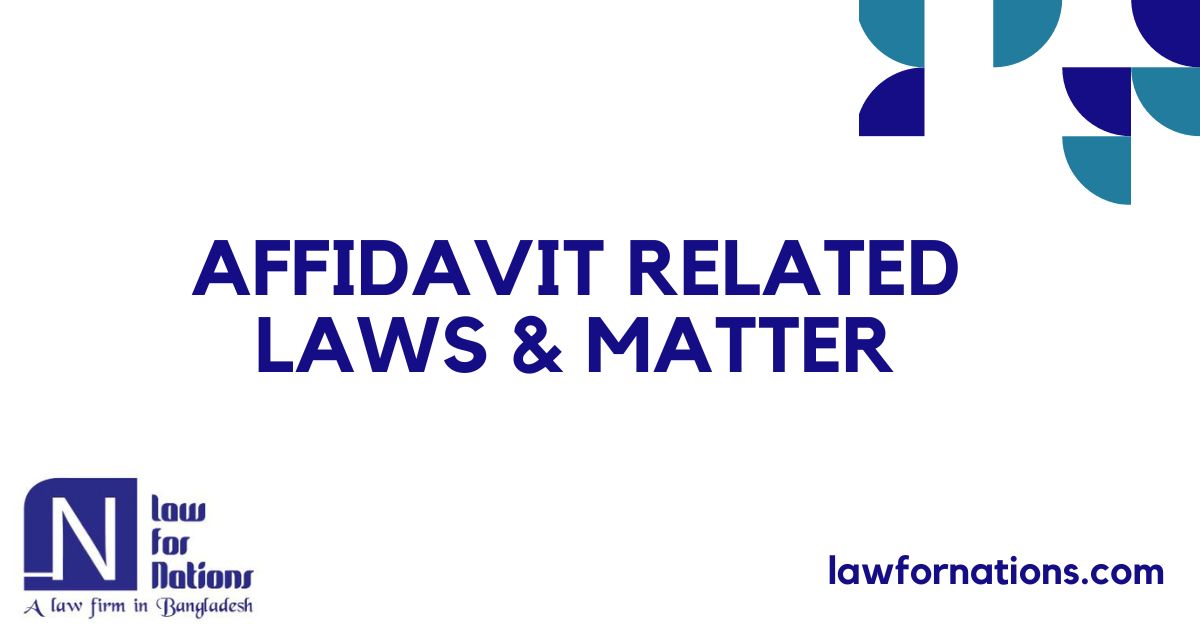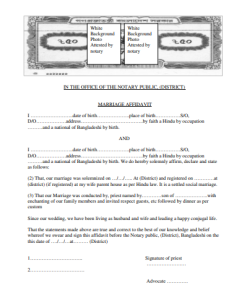
What is an affidavit:
A statement or declaration made in writing under oath or affirmation by an adult before the person having the authority to administer oath or affirmation is known as an affidavit. Affidavits can be used in a wide range of circumstances, including legal proceedings, property conflicts, immigration challenges, marital problems, divorce problems, and name correction, among others. The executor assumes some responsibility for the veracity of his remarks by signing an affidavit.
Elements of Affidavit:
Following are the main elements of affidavit-
- Statement or declaration in writing;
- The statement or declaration must be on oath or affirmation;
- Oath or affirmation must be administered by a person authorized by law to do so.
Types of Affidavit:
Affidavit may be classified into two main groups:
- Affidavit on judicial matters:Affidavit on judicial matters make before Magistrate or Commissioner of Affidavit or Sherestadar (Claek). In court practices, it is needed to file an interlocutory application with affidavit and in the High Court Division most of the motions and other applications have to filed with affidavit. In subordinate courts, some complaint petitions to be filed with an affidavit.
- Non Judicial: Affidavit on non judicial matters make before Notary Public or Sub-Registrar or Magistrate or other authorized persons. In this type of affidavit people mainly make declaration relating to certificate, marriage, divorce, statements regarding the birth date or name correction in various document etc.
List of common matters where we need affidavit:
- Affidavit for Court Purposes;
- Affidavit for correction of Birthdate:
Affidavit for correction of Name;
Affidavit for Marriage;
Affidavit of insolvency for financial support;
- Affidavit for Divorce;
Affidavit for lost passport;
Affidavit for showing financial solvency for the Bangladeshi students who are willing to go USA, Uk Canada, Australia for higher studies;
Affidavit for not working;
Affidavit for anti ragging;
Affidavit for compromising a compoundable criminal case;
Affidavit for Joint Owners;
Affidavit for filing motion and other applications before High Court Division;
Affidavit for Contract of Pupilage to become a lawyer;
Affidavit for buying or selling a vehicle or to register;
Affidavit for the change of religion;
Affidavit for change/specimen signature;
Affidavit regarding bona-fide/legitimate marriage for visa/immigration/other purposes;
Affidavit regarding late birth registration and relationship for USCIS Request for Evidence (RFE) notice, visa, immigration and other purposes;
Affidavit regarding unmarried certificate for visa/immigration/other purposes.
Affidavit for sponsorship of students regarding visa/immigration/other purposes.
Persons who can be deponent in affidavit:
Any person who is major according to the Majority Act, 1875 having sound mind can be a deponent. In case of minor guardians can be deponent on behalf of their minor child.
Persons who can administer affidavit:
Normally, the affidavit is administered by notary public, magistrate, or commissioner of affidavit as per specific requirements of the subject matter; however, the government may designate any other court or individual to administer the oath to the deponent. It is also important to note that in various cases some government form can be treated as an affidavit where the respective officer/person administer the oath.
Laws relating to administer an affidavit:
Under section 139 of the Code of Civil Procedure, 1908 an affidavit may administer by –
(a) any Court or Magistrate, or
(b) any officer or other person appoimted by the Supreme Cour in this behal or
(c) any officer chosen by any other court to whom the government has given general or specific authority in this regard.
Under section 539 of the Code of Criminal Procedure, 1908 affidavits and affirmations to be used before High Court Division. The deponent has to be sworn and affirmed before the cmmissioner of affidavit or any other person appointed by such Court for that purpose.
Legal effect of an affidavit:
Affidavits are used as evidence like estoppel from retrieving which is provided under section 115 of the Evidence Act of 1872. Similarly, if one’s affidavit is found to be false and made with mala fide intention he could be punished under Section 193 of The Penal Code, 1860 which provides the consequences for providing false evidence. One may be punished with up to 3 years imprisonment with fine for misuse of a non-judicial affidavit and in the matter of judicial matter it could be up to 7 years of imprisonment with fine. And in the matter of the Bangladesh Bar Council, one could be barred for 5 years if he presents false information along with other legal consequences.
Procedure of making an affidavit:
It is better to take professional help from an advocate before making an affidavit. For preparing an affidavit one has to know the proper format or collect the correct form. The appropriate form can be found to lawyer, government office, or court. All the necessary information like the name and address of the person making the affidavit, the statement being made, and the signature of the person, the photo of the person, the NID of the person making the affidavit should be included in the form. Once one have the form, he will need to write the statement that he wish to make. This statement must be written in a clear and concise manner regarding the relevant fact . It is important to ensure that the statement is true and accurate. After writing the statement appropriately, the next step is to swear affidavit. This can be done by going to a notary public/ magistrate/commissioner of affidavit. The notary public/ magistrate/commissioner will administer an oath or affirmation to the person making the affidavit, and will then witness the signature on the form. After swearing the affidavit, it can be submitted to the relevant government office or court. The office or court will then review the affidavit and determine whether it is acceptable. If the affidavit is accepted, it should be kept by the deponent for future reference.
How to get affidavit through online:
Using our website www.lawfornations.com one can get a non judicial affidavit (affidavit relating to marriage, divorce, name correction, visa etc) through online. To get an affidavit in online one must provide all the necessary informations required through mail including his electric signature. Then, we will draft his affidavit on stamp paper. Then he can execute and complete his affidavit through our online platform at www.lawfornations.com with a prior appointment schedule with a Certified Notary Public of Bangladesh Government. Afterthat, we will send him the affidavit via courier within very short time.
Costs of Affidavit in Bangladesh:
Costs of affidavit are not so very high. It depends on the type of affidavit, drafting, advocate fee, Clark fee, stamp fee, compose and printing charges etc.
Sample of an Affidavit in English:

